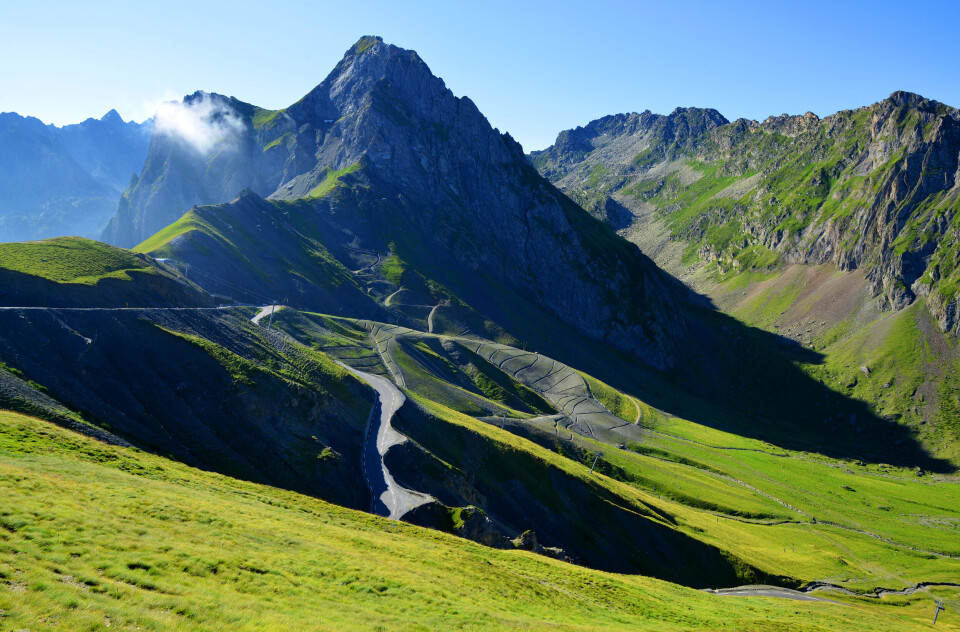-
Five departments on orange alert as heavy rain and floods continue in south of France
Conditions are expected to worsen through the afternoon
-
‘I saw flames’: Air France plane makes emergency landing in Lyon after technical fault
Flight carrying 173 passengers to Ajaccio diverted to Lyon-Saint-Exupéry on Saturday
-
Farmers’ protests ease but key motorway blockades hold firm in south-west France
Pressure on the government over its handling of cattle culls continues as Christmas nears despite a drop in protests
New French stamp issued in honour of Pyrenees mountain pass
There will be 700,000 copies available of the vintage-style postage stamp, which shows the famous pass set to be visited by next year’s Tour de France

The French post office has issued a new postage stamp in honour of the Tourmalet pass in the Pyrenees, which is set to feature in the Tour de France 2023 route.
The stamp, issued yesterday (Monday, July 11), shows a vintage poster-style image of the pass, which offers beautiful panoramic views across the mountains.
The artwork was created by illustrator Doz. The stamp has a value of €1.16 (lettre verte, green letter), and 700,000 copies will be sold.
Le carré d'encre ce matin rencontre avec l'artiste M. Doz créateur du timbre sur le Tourmalet. pic.twitter.com/JNkWz6Wa7D
— david (@commarmond) July 8, 2022
The stamp was first put on sale in locations close to the pass, including the tourism office in Bagnères-de-Bigorre, and the mairie at Barèges.
The Tourmalet pass sits at an altitude of 2,115 metres, and is part of the legendary series of mountain passes that often feature in the Tour de France cycling race route.
The peloton is set to visit the pass in its 2023 itinerary.
[VENTE GÉNÉRALE] du #timbre Le #Tourmalet #HautesPyrénées disponible dès aujourd'hui :
— ToutSurLeTimbre (@toutsurletimbre) July 11, 2022
🚵 dans la plupart des bureaux de poste
🚵♀️ sur https://t.co/MQwazMI3Xm
🚵♂️ au Carré d'Encre #Paris 9e arr.
🚵 auprès de #Philaposte : sav-phila.philaposte@laposte.fr@LPNews_OCC #cyclisme pic.twitter.com/pgtbSLZArg
It is located around 50 kilometres south of Tarbes, in Hautes-Pyrénées, and is the third-highest mountain pass in the French Pyrenees, after the Tentes pass and the Portet pass.
What’s in a name?
Some suggest that the name ‘Tourmalet’ comes from the words ‘détour mal’ (bad detour), from the Latin ‘malum’ for bad.
However, there is no evidence that the pass had any ‘bad’ associations, however, beyond perhaps certain incidents suffered by the first ‘tourists’ in the 19th and early 20th centuries.
In fact, some suggest that the word ‘mal’ is not a signifier of something negative, but instead comes from the Gascon word ‘mau’, whose root is ‘malh’, meaning ‘mountain’ or ‘dry mountain’. The prefix ‘tur’ sometimes meant ‘distance’.
Therefore, the word Tourmalet may in fact have meant ‘far-off mountain’, rather than ‘bad detour’.
le timbre à l’effigie du col du Tourmalet
— vue sur les pyrénées (@vuesurpyrenees) July 4, 2022
A l'occasion du #TourdeFrance , les 8 et 9 juillet 2022https://t.co/ty5mMk8iye
En avant première de la sortie nationale #philatelie #occitanie #pyrenees #tourdefrance #hautespyrenees pic.twitter.com/PgVH7fvEX0
























